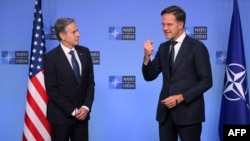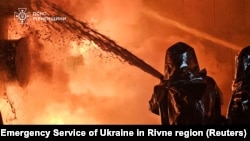Western leaders are calling for continued military support to Ukraine as it battles Russia's nearly 3-year invasion but are balking at the Kyiv government immediately joining NATO, the West's main military alliance, for fear it would drag the allies into a wider conflict with Moscow.
U.S. Secretary of State Antony Blinken, meeting Tuesday with NATO Secretary-General Mark Rutte in Brussels ahead of a foreign ministers meeting, discussed what the U.S. State Department said were "concrete steps" the West could take to help Ukraine defend itself.
Although the 32 NATO countries have declared that Ukraine is on an irreversible path to membership in the post-World War II alliance, Rutte said the immediate priority must be to provide more arms to the country's forces as Russia gains territory along the battlefront in eastern Ukraine.
"The [Ukrainian] front is not moving eastwards. It is slowly moving westwards" in Russia's favor, Rutte said. "So, we have to make sure that Ukraine gets into a position of strength, and then it should be for the Ukrainian government to decide on the next steps, in terms of opening peace talks and how to conduct them."
Ukrainian President Volodymyr Zelenskyy agreed, saying his country needs "significant reinforcements" of its arms supplies in the Donetsk region.
"The greater our army's firepower is, the more technological capabilities we have, the more effectively we can destroy Russia's offensive potential and protect our warriors' lives," the president said in his daily address Tuesday.
Zelenskyy said in addition to "detailed discussions" Ukraine has held with its partners on this issue, "We are working on our own, boosting our production, our Ukrainian defense industry." He said Ukraine is working to "have more long-range capabilities of our own."
British Prime Minister Keir Starmer said in a speech late Monday that Ukraine's allies must "do what it takes to support their self-defense for as long as it takes," but acknowledged that the war will end in negotiations and potential compromise.
Starmer said that allies must "put Ukraine in the strongest possible position for negotiations so they can secure a just and lasting peace on their terms that guarantees their security, independence — and right to choose their own future."
Zelenskyy said Sunday that an invitation to join NATO "would fundamentally strengthen Ukraine before any negotiations to end the war."
Under the NATO pact, an attack on any of its member countries is considered an assault on all of them. But the provision has been invoked only once, as Western allies joined U.S. forces to fight al-Qaida in Afghanistan after its terrorists attacked the U.S. in 2001, killing nearly 3,000 people.
With that NATO requirement in mind, Western allies have balked at Ukraine membership in the alliance while the war with Russia rages on. Nonetheless, the Ukrainian Foreign Ministry on Tuesday said Kyiv "will not settle for any alternatives, surrogates or substitutes for Ukraine's full membership in NATO," citing its "bitter experience of the Budapest Memorandum."
Under that pact signed 30 years ago in the Hungarian capital, Ukraine agreed to give up its Soviet-era atomic weapons, which amounted to the world's third-largest nuclear arsenal, in return for security guarantees from Russia, the United States and the United Kingdom.
Ukraine called the Budapest agreement a "monument to shortsightedness in making strategic security decisions."
Now, it said, "We are convinced that the only real guarantee of security for Ukraine, as well as a deterrent for further Russian aggression against Ukraine and other states, is Ukraine's full membership in NATO."
Western allies had already pledged hundreds of millions of dollars in new military aid to Ukraine ahead of the foreign ministers' meetings, including new rounds of assistance from the United States and Germany.
Rutte told reporters that allies "need to continue our steadfast support" and that military aid is the most crucial task at this time.
The additional aid comes seven weeks ahead of U.S. President-elect Donald Trump taking office again. He has refused to say he wants Ukraine to defeat Russia and voiced skepticism about continued U.S. military aid. He has said he will resolve the war before he takes office January 20 but has not explained how that would happen.
Rutte also expressed concern about and condemned outside support from other countries for Russia's war effort.
"China is active in sanctions circumvention, is active through dual-use goods they deliver to Russia, and therefore China, but also Iran and North Korea, they're all involved in Russia's full onslaught on Ukraine," Rutte said.
Iran has supplied drones to Russian forces, while North Korea has sent thousands of troops to Russia.
On the battlefront, Ukrainian officials said Tuesday that Russian aerial attacks overnight damaged energy infrastructure in the western regions of Rivne and Ternopil.
In the Dnipropetrovsk region, Governor Serhiy Lysak said on Telegram that Russian shelling and a drone hit the city of Nikopol, damaging multiple homes, a gym, and gas and power lines.
Russia's Defense Ministry said Tuesday it shot down a Ukrainian drone over the Belgorod region and another drone over Bryansk.
Some information for this story came from The Associated Press and Reuters.






